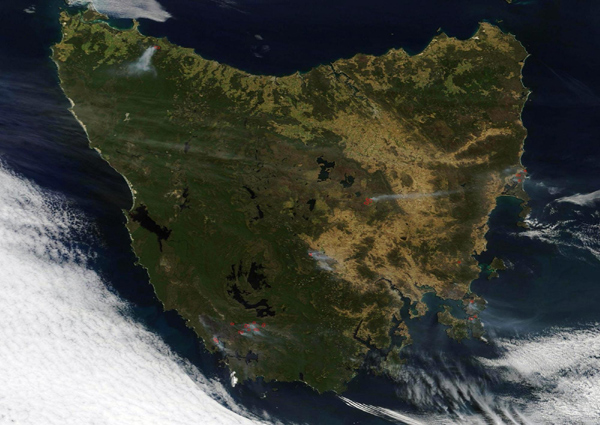Extreme heat puts new colors on Aussie weather maps
Updated: 2013-01-10 09:09
(China Daily/Agencies)
|
|||||||||||
Tasmania Police Acting Commissioner Scott Tilyard said in a statement, "There are no reports of missing persons in circumstances that cause us to have grave fears for their safety at this time."
The fires have been most devastating in Tasmania, where at least 128 homes have been destroyed since Friday and more than 80,000 hectares burned. Hundreds of people remain at two evacuation centers in the state's south.
 |
|
View from the Terra satellite shows fires burning in Tasmania in this NASA handout image dated Jan 7, 2013. Image taken Jan 7, 2013. [Photo/Agencies] |
Tasmanian Premier Lara Giddings said, "People have lost everything. We can't comprehend that devastation unless we are in their shoes."
In the state of Victoria, a fire injured six people, destroyed nine homes and caused the evacuation of the farming community in Carngham west of the city of Ballarat.
In New South Wales, Australia's most populous state, firefighters were battling 141 fires, including 31 that had not yet been contained. Fires burning out of control near the towns of Cooma, Yass and Shoalhaven were the most worrying.
Wildfires are common during the Australian summer. Fires in February 2009 killed 173 people and destroyed more than 2,000 homes in Victoria.
Jones, the meteorologist, said the current heat wave was a progression of the last four months of 2012, which were the hottest September-December period on record in Australia.
With Wednesday's cooling down in southern Australia, the capital, Canberra, dropped from a high of 36 C on Tuesday to 28 C and Sydney dropped from 43 C to 23 C.
But Jones expects Wednesday will rank among Australia's hottest days when national temperatures are calculated. This is because the extreme heat has shifted from the heavier populated south to northern and central Australia.
The bureau forecast aboveaverage temperatures for the remainder of summer, compounding the fire danger created by a lack of rain across central and southern Australia over the past six months.
"It is going to be very challenging," Jones said of the wildfire danger.
Reuters - AP
Today's Top News
President Xi confident in recovery from quake
H7N9 update: 104 cases, 21 deaths
Telecom workers restore links
Coal mine blast kills 18 in Jilin
Intl scholarship puts China on the map
More bird flu patients discharged
Gold loses sheen, but still a safe bet
US 'turns blind eye to human rights'
Hot Topics
Lunar probe , China growth forecasts, Emission rules get tougher, China seen through 'colored lens', International board,
Editor's Picks

|

|

|

|

|

|





